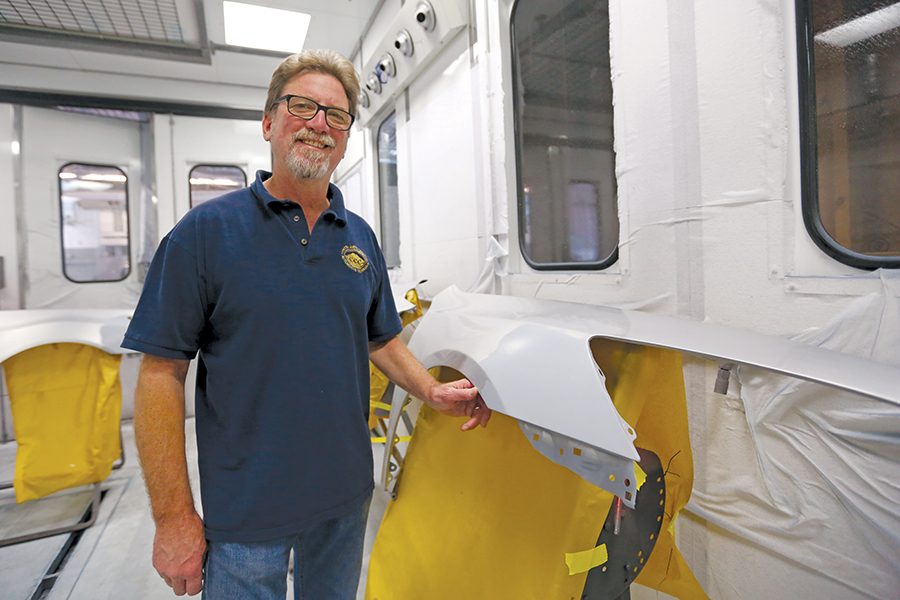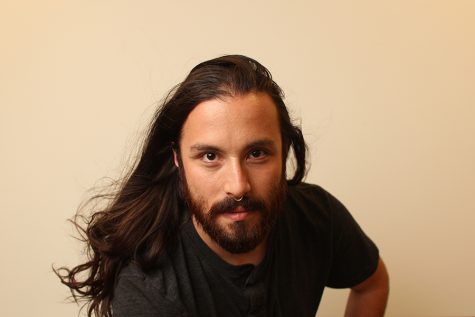Mentor establishes legacy
Instructor perfects collision repair program over 37 years of service, dedication
Automotive professor and former department chairperson Peter Lock began as a student at CCC in 1973. Lock is retiring after 37 years working at the college.
May 18, 2016
Automotive technology professor and former department Chairperson Peter Lock is retiring this year, leaving behind a legacy of mentoring and compassion. Lock is responsible for facilitating the careers of countless Contra Costa College collision repair graduates, who are now working in the industry.
Automotive technology professor and former department Chairperson Peter Lock is retiring this year, leaving behind a legacy of mentoring and compassion. Lock is responsible for facilitating the careers of countless Contra Costa College collision repair graduates, who are now working in the industry.
“If you go to a shop 50 miles around you’ll find a CCC graduate of the program,” automotive assistant Jim Gardner said. He said Lock’s true work begins after class ends, getting students jobs.
Lock graduated from Contra Costa College and has spent 37 years developing and maintaining an auto collision repair program that is recognized on a national level.
“His roots here are deep,” automotive department Chairperson Lucile Beatty, said at the Annual Retreat Retirement and Staff Reunion.
Lock said his fervor for things automotive and mechanical started at a young age, taking apart lawnmowers in his backyard with his leaving tools out to rust in the rain frustrating his dad.
From that long-standing curiosity, Lock enrolled in automotive shop classes in high school.
“It just kind of built up from there,” Lock said.
“Even in high school I was actually working in a collision repair shop, working a lot of hours, I got a lot of experience even before I came to school here,” he said.
Lock said in high school he caught a glimpse of what was possible with paint and hard work. He and his friends owned motorcycles, and looking to improve the look of his own bike he painted it with spray cans sanding and polishing the different parts by hand.
”I was able to see what could be done with paint and my friends wanted me to do their bikes also,” Lock said.
After high school Lock enrolled at CCC in 1973 taking automotive collision repair courses and ultimately earning his AS in Automotive Collision Repair.
“When I came to school here it wasn’t really a training program it was more of a hobby shop,” he said.
Lock said he initially intended on enrolling in the automotive mechanic classes but they were full and not being able to get in to his first choice, he choose to take collision repair courses instead.
“So I signed up for this and here I am,” he said.
“It was a blessing in disguise not to be the into auto repair program and this is not a knock on the mechanics but a lot of times you do things on a car and then you shut the hood. On the collision repair side whatever you do is all visual, the interior, the exterior, wheels tires, painting, body repair.”
Lock returned to CCC in the fall 1979, coming from working in the collision repair industry, when he was hired as an automotive repair instructor.
“I taught one semester as a part-time professor and before becoming the departments chairperson,” Lock said, “I was 23 years old.”
“I was in charge of both departments and that was very difficult to oversee something I was really not a part of (Automotive Repair) but I had good faculty, professors, part-timers that came from the industry and are still in the industry and I’m quite proud of that, to bring in industry from professionals and shop owners, people who knew their craft.”
Lock has been a mentor and friend to many students and faculty a like while in the automotive department at CCC.
“Peter gets to know the student’s, he meets them individually and as a whole, automotive is just great that way because students have to work in teams when out on the floor in either of the shops,” Beatty said, “They are always learning how to learning how to work with people that are different from them.”
Lock teaches students problem solving whether it pertains to issues with collision repair work or morality, on or off the shop floor she said.
Automotive technology major Josh Paoli said, “I quit the automotive repair side because I heard he was retiring and everyone told me he was the best around,” he said.“He figured out a way to teach me and not everyone takes the time to do that. He’s constantly challenging students with work but also allows you to figure out things on yourself, that’s how you really learn.”
Without the work and foundation set by Lock the automotive department would not be where it is today Beatty said,
“The collision repair program doesn’t have and has never had the budget that required to build and maintain a premiere collision repair program.”
Beatty said the connections that Lock brought to the department throughout his time here have donated time, materials and resources needed to fuel the departments needs.
“He’s not only been a teacher, he’s been a fundraiser and networker who has been determined to provide the best program for his students,” she said.
Undecided major Waleed Dabwam said. “He’s an outstanding teacher, friend and mentor. It’s my first semester here but we’ve connected like we’ve known each other for years.”
“I’ve approached him with something that I couldn’t even approach my family with. He was very helpful and even followed up with me afterwards to see how I was doing.”
Through his networking from within the collision repair industry Lock has been able to offer I-Car educational programs to students.
“I-car is an international organization that provides the standards for collision repair training in this industry,” Beatty said, “So students can become I-Car certified while enrolled in the program, but also collision repair shops bring in their employees to get certified or maintain their certification.”
By offering this program, Lock has created an environment that is provides networking opportunities for students to find work after graduation, being in classes with industry professionals.
Although Lock is retiring this year, he will remain a part-time professor in the automotive department as well as maintaining a position on the Advisory Committee he said.
“My life’s going to be to continue to work for a couple more years. I’ll teach part-time a little but as soon as everything evolves and either they don’t need me or it time to go, that’s it. I have a 3-year-old grandson so I will be able to take care of him when my daughter goes back to school.”
Lock aims to use whatever newfound free-time he has to finishing a re-model and restoration project he undertook in 2011 with a purchase of a “fixer upper home” as well as traveling with his family for his sons upcoming wedding in Mexico in November, he said.
“I look forward to keeping that going, finishing up the house. We’re going to be traveling a little bit, having some weddings, going through construction and I’ll be teaching part time, so I don’t see too much of a drop-off. I’m not one who’s going to sit and read the paper all day, I’ll read the paper but not all day,” He said.
“It was fun, I came in with a smile and I’m leaving with a smile. I’ve seen a lot of people leave bitter from Contra Costa College and I don’t know how in the hell that can happen.”



